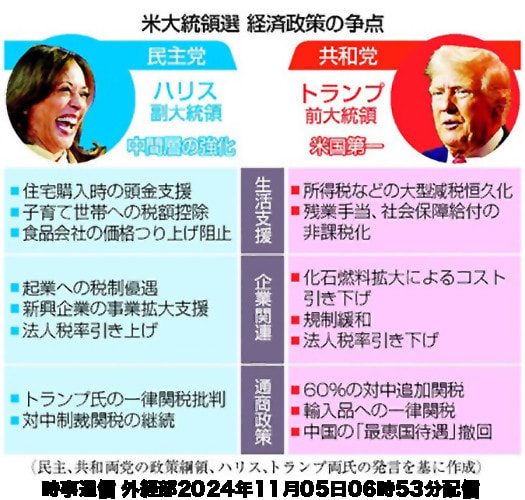
昨日は結局、札幌市西区のわが家周辺、山の手地区では断続的に降雪が続き、本日朝には家の前はグチャグチャな多水性の雪が重なっている状態。本格的に「除雪」する必要があるかどうか、というところであります。たぶんこのグチャグチャ道では早朝散歩はちょっと、なのでその分、ブログ記述後せっせと初雪かきとなることでしょう。雪、重そうであります(泣)。しょがない。北国の宿命。
さて昨日までで、アメリカの政権選択にトランプ勝利という決定が下された。その力学が今後の日本経済にどのように影響してくるのか、予測を立てて行く必要がある。わたしも創業企業からは退隠したとはいえ、個人企業としては引き続き住宅情報関連の仕事なので、約3ヶ月ほどのアメリカの政権移行期を経て以降の経済動向を考えていく必要があると思っています。経済面で言えば、一般的にアメリカの経済政策が日本経済や金融市場に影響を与えることが多いとされるし、現実に強固な日米関係の基軸は第2次大戦以降の「経済同盟」関係であることはあきらか。
コロナ明け以降のアメリカのインフレが反映して住宅建材価格が暴騰し、それが住宅価格の世界的高騰を招いたことが日本の住宅取得層に大きな影響を与えて、とくに今期には住宅着工減少があきらかになってきている。政治というのは基本的に経済の状況を反映するものであって、為政者には経済の相場観というものが最重要なのだと思います。仁徳天皇の民のカマド伝承の通り。
アメリカの人びとはトランプの2017-20年の4年間の経済運営実績を踏まえてその政権を再度選択した。その後のバイデン政権とその後継を狙ったハリスにNOを突き付けたということでしょう。生活コストの急上昇に対して民は経済最優先という選択を行ったと言える。
まだ選挙の結果が出たばかりで、そうした経済分析情報はそう多くは出てきていないけれど、今後の住宅市場を見通していくときに、大きな方向性指標がトランプ政権によって打ち出されてくることでしょう。上の図は時事通信外報部11/5配信のもの。経済面では一般的にアメリカの経済政策が日本経済や金融市場に影響を与えることが多く、簡略にまとめられていてわかりやすい。
要注目と思われるトランプの政策としては、化石燃料拡大によるコスト引き下げという経済活性化の「方法論」を明確に示していること。トランプはさらに所得税などの「大型減税」恒久化、さらに残業手当、社会保障給付の非課税化を打ち出している。
よく知られているけれどバイデン政権は環境・エネルギー政策のグリーン化を掲げ、それまでの「シェールガス革命」を痛撃してきていた。
こうした方向性は第1次政権時と基本的には志向性が同じだと思える。こういう志向性と日本の為政者であった安倍政権の打ち出した「アベノミクス」が呼応していた。大きな世界経済の方向性はこういった方向に向かっていくのではないか。ただ、いま現在の日本の政権には明確な「経済施策」の考え方が希薄。あるとすれば財務省による「増税路線」。この日本の増税路線とアメリカ・トランプ政権の減税・経済活性化路線とがはたして整合するだろうか? 大きく疑問。さてどうなるか?
English version⬇
[What about economic policy and the housing market under a Trump 2.0 administration?
Politics is paramount to the economic market outlook. From Biden's “environmental focus” that nearly stifled the shale gas revolution to the Trump administration of fossil fuel expansion => cost reductions. ...
Yesterday, it ended up snowing intermittently in the Yamanote area around our house in Sapporo's Nishi Ward, and by this morning, the front of our house was covered with a layer of soggy, multi-level snow. We are wondering if we need to “plow” the snow in earnest. I'm not sure if I'll be able to go for an early morning walk on this muddy road, so I'll have to shovel the first snow after writing this blog. The snow looks heavy (I cry). It can't be helped. The fate of a northern country.
As of yesterday, the decision to choose the U.S. administration has been made in favor of Trump. We need to make predictions on how the dynamics will affect the Japanese economy in the future. Although I too have retired from the founding company, I continue to work in the housing information business as a private firm, so I believe it is necessary to consider the economic trends after the approximately three-month transition period of the U.S. administration. In terms of the economy, it is generally believed that the U.S. economic policy often affects the Japanese economy and financial markets, and it is clear that the cornerstone of a strong Japan-U.S. relationship in reality is the “economic alliance” relationship that has existed since World War II.
The price of building materials has skyrocketed, reflecting inflation in the U.S. since the dawn of the Corona, and this has led to a global surge in housing prices, which has had a major impact on Japanese homebuyers, especially in the current quarter, when a decline in housing starts has become apparent. Politics is basically a reflection of the state of the economy, and I believe that the view of the economic market is of utmost importance to politicians. As per the Kamado lore of Emperor Nintoku's people.
The American people chose that administration again based on Trump's four-year track record of managing the economy in 2017-20. After that, they would have said NO to the Biden administration and Harris who tried to succeed him. It can be said that the people have made the choice to put the economy first against a sharp rise in the cost of living.
Although the election results have only just come in and not much information on such economic analysis is available, the Trump administration will provide a major directional indicator for the future of the housing market. The figure above is from the Jiji Press Foreign Affairs Department, November 5, 2011. In terms of the economy, U.S. economic policies generally affect the Japanese economy and financial markets, and it is easy to understand in a simplified form.
One of Trump's policies that we believe is important to note is his clear “methodology” for stimulating the economy by lowering costs through the expansion of fossil fuels. Trump has also proposed making permanent “major tax cuts” such as income taxes, as well as exempting overtime pay and social security benefits from taxes.
As is well known, the Biden administration has been pushing for a green environment and energy policy, and has been taking a hard hit against the “shale gas revolution” that had been underway up to that point.
This direction seems to be basically the same as that of the first administration. This orientation corresponded with the “Abenomics” of the Abe administration, which was in power in Japan. The direction of the global economy is likely to move in this direction. However, the current Japanese administration does not have a clear-cut “economic policy” in mind. If there is one, it is the Ministry of Finance's “tax hike policy. Will Japan's tax hike policy be consistent with the U.S. Trump administration's policy of cutting taxes and revitalizing the economy? It is highly doubtful. What will happen now?


















